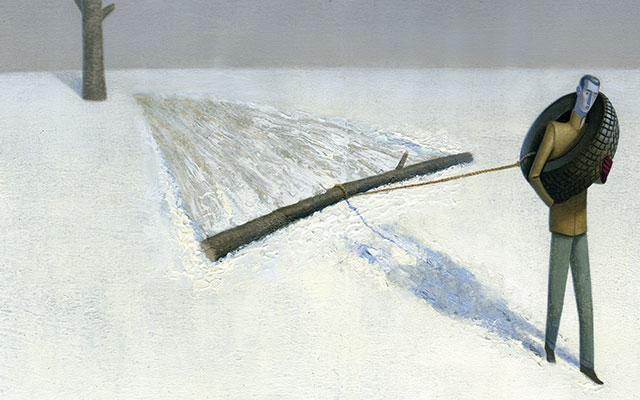Expert Source: Donna Jackson Nakazawa, author of The Last Best Cure: My Quest to Awaken the Healing Parts of My Brain and Get Back My Body, My Joy, and My Life and Childhood Disrupted: How Your Biography Becomes Your Biology, and How You Can Heal.
Emotional pain and trauma from youth can haunt us well into adulthood, as far too many of us know. Mind–body researchers use a special term to describe a range of negative situations that can create toxic childhood stress, especially in circumstances where the child doesn’t have adequate adult support: Adverse Childhood Experiences or ACEs.
Abuse is a leading cause, of course, but as Donna Jackson Nakazawa notes in her book Childhood Disrupted, ACEs can also result from common family dysfunction, such as being separated from a parent due to divorce or living with a parent facing a mental-health crisis.
The chronic stress caused by ACEs can make it harder to handle stress later in life. It can even promote illness, particularly autoimmune diseases. Research suggests that ACEs actually alter the brain, affecting stress-response genes. This in turn can set off an inflammatory response that can bring on lifelong physical symptoms.
But ACEs don’t have to debilitate or hold you back. Nakazawa offers these strategies to help you care for yourself and lessen the burden today.
Challenges to Overcome
- Dismissing the significance of ACEs. It’s natural to assume that because the chronic stress or damage occurred in childhood, we’ve somehow “naturally” outgrown it, says Nakazawa, or that we ought to be able to put it behind us by an act of will. “We’re all part of a culture that has trouble believing that something that’s unseen and happened 30 years ago could possibly have anything to do with what we’re feeling today,” she says.
- Fear of rocking the boat. You may worry that bringing up your stressful childhood experiences will cause your family pain. And you’re not likely to get agreement from all of your siblings, for example, that abuse or neglect even occurred. “Different people have different experiences of the same family,” Nakazawa says.
- Being unwilling to open and explore old wounds. Revisiting these issues could bring back painful, repressed memories and make you even more conscious of the emotional and physical price you’ve paid. Denying that there’s a problem may feel more comfortable than delving into your troubled past.
- Survivor guilt. If your household produced adverse childhood experiences that heavily damaged your siblings while you “escaped” with less obvious wounds, you may feel a form of the classic “Why was I spared?” guilt. This could reinforce your tendency to minimize the damage represented by your current stress, anxiety, or illness.
- Chronic anger. “Anger can be very healthy and motivating when you are suffering,” Nakazawa says. “But if you’re stuck in anger for what happened when you were a child, you are simply reliving the past over and over, and it’s just not as helpful as deciding to move forward and fall in love with life again.”
- Shame. You may feel like you’re weak or “less than” for not being able to overcome the effects of your childhood experience, particularly if you find yourself in extreme pain or stress because of the legacy of what happened to you. You may also fear the stigma of being labeled a hypochondriac or a “permanent victim” if you address the problem openly.
- Inability to be present. “When we’re suffering from the pain that comes with ACEs, we tend to be stuck in the past, running old scenarios, or running future fears,” says Nakazawa. “It can be very hard to be grounded and comfortable in the present.”
Strategies for Success
- Understand the implications of your experience. “Chronic childhood stress can lead to changes in the developing brain that reset the stress response to ‘high’ for life, which in turn promotes inflammation, and later, even disease,” says Nakazawa, who points out that all disease is multifactorial. Numerous studies have demonstrated not just a psychological connection, but a neurobiological one, between ACEs and current symptoms like anxiety, trouble with impulse control, overeating, and even autoimmune diseases such as thyroiditis, psoriasis, and rheumatoid arthritis. Learning about ACEs and their consequences can help you begin the process of healing.
- Realize you’re not alone. One of the best ways to accept your own experience, Nakazawa says, is to understand that you’re not an exception. The landmark Adverse Childhood Experiences Study found that 64 percent of the more than 17,000 participants had experienced at least one ACE.
- See a professional first. If you realize you’ve experienced ACEs (learn how to get your “ACE score” below), resist the temptation to discuss this with your parents or siblings right away. Nakazawa suggests talking first to a therapist or doctor you trust. “Simply having that conversation and being accepted and listened to will allow an opening toward healing. I’ve seen people for whom finally understanding what happened to them and how it may be contributing to their anxiety or illness makes them feel as if there is a realignment of the earth’s axis.” It can start the process of letting go of shame, survivor guilt, and toxic resentment.
- Write or draw your story. “The act of getting your experience down on paper can be very healing,” Nakazawa says. “You might write it in the form of a letter to your parents — even if you never send it — or to your therapist or doctor. The act of saying ‘this is my story, this is my reality’ is a powerful thing to do.” Drawing, she adds, is another effective way to get your story on paper. You might draw your family, and as you do so, see what images come up. Then you can put the drawing away for a day, come back to it, and analyze it: What insights emerge about what you experienced?
- Practice mindfulness. “Both mindfulness meditation and mindfulness-based stress-reduction techniques help develop the ability to detach from your thoughts,” says Nakazawa. “And they will put you in the here and now — getting you out of the past-and-future focus and grounding you.”
- Explore movement-based therapies. Yoga, tai chi, qigong, and other gentle, movement-oriented practices can also help you focus on the present moment, says Nakazawa. Yoga has been shown to bring calm by decreasing blood flow to the amygdala, the brain’s “alarm bell,” while increasing it to the frontal lobe and the prefrontal cortex, brain areas that are associated with judgment, choice, and planning.
The Trauma That Never Ends — More Resources
Got Your ACE Score? A site where you can take a test to determine, in a general way, whether you experienced ACEs as defined by Vince Felitti’s research. The experiences include physical abuse, verbal abuse, addiction or mental illness in a parent, insufficient food or clothing, and others.
Childhood Disrupted: How Your Biography Becomes Your Biology, and How You Can Heal (Atria Books), by Donna Jackson Nakazawa. Our expert source’s most recent book, an in-depth look at the nature and neuroscience of ACEs, combined with a wealth of help on how to handle their legacy in adulthood.
“Can Family Secrets Make You Sick?” by Laura Starecheski “Shots” blog, National Public Radio The story behind the research into ACEs, with insights into how the events may be making you physically ill as well as psychologically stressed.
ACEs by Vince Felitti, MD A YouTube video in which the leader of the original research team on ACEs describes how he came to understand them and their effects.
This article originally appeared as “Burdens of the Past” in the December 2015 issue of Experience Life.




This Post Has 0 Comments